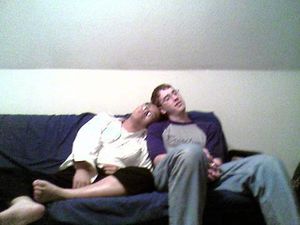Todd Li Triangle
The Todd Li Triangle in logic is a theorem devised to explain the phenomenon of true love when involving Asians [1].
First expounded upon by the ancient Korean philosopher Mr. Meenoch c. 1066 CE, the theory holds that if one nurtures a disproportionate lust for Asians above other races that one must, in theory, love Todd Li, as he is, indeed, Asian. Meanwhile, if there were a second individual that also maintained an excessive enamoration of Asians, then it should follow that the second party would also love Todd Li. Therefore, by employing the transitive property, the two individuals would henceforth be in love with each other.
The Theorem[edit | edit source]
| Statement | Proof |
|---|---|
| 1. Andrei loves Asians | 1. Given |
| 2. Meenoch loves Asians | 2. Given |
| 3. Todd Li is Asian | 3. Given |
| 4. Andrei loves Todd Li | 4. Statements 1 and 3 and Modus Ponens |
| 5. Meenoch loves Todd Li | 5. Statements 2 and 3 and Modus Ponens |
| 6. Both Andrei and Meenoch love Todd Li. | 6. Statements 4 and 5 and Consolidation |
| 7. Q.E.D. Andrei and Meenoch are deeply in love with each other. | 7. Statement 5 and the Todd Li Triangle |
Controversies[edit | edit source]
A number of well-regarded philosophers and mathematicians, such as Bertrand Russell, Sir Isaac Newton, and Tyco Brahe, have called into question the scientific value of the Todd Li Triangle based on the indefinite nature of love. Russell himself once spoke of the matter in an interview with Barbara Walters: "I work in mathematics, which is an exact science. Love, however, tends to be a science of randomocity." Although many agree with this statement in general principle, the theory's proponents point out that Dr. Russell was likely bitter at his well-documented arid love life. Others defend the theory on the basis of grammatic technicality, as the word "randomocity" was not invented until the summer of 2005 by a five-foot-tall-on-a-good-day high school junior, long after Dr. Russell was purported to have used it in that particular interview, subsequently indicating that his statement was not actually a complete thought and therefore null and void.
Others, such as renowned and often reviled esotericist and occultist Julius Evola, have posited that the entire theory is naught as he claims that one is incapable of possessing a love for another outside of their race. Further, in his 1925 work entitled Saggi sull'idealismo magico Mr. Evola decries the theory's basis in physical attraction as he states that relationships emerge primarily out of a precise Nordic magic of idealism that prohibits miscegenation. This criticism is often disregarded as it is no mystery that Evola habors many racist sentiments stemming from a low self-esteem and infantile need for attention, much as a disgruntled child fresh from nascency whose mother decided to bottle-feed.
Support for the Theory[edit | edit source]
The theory has been defended by Nobel Prize Laureate, Chilean poet Pablo Neruda, who is respected world-wide as one of the foremost scholars on the subject of love - a veritable Don Juan. Neruda believes that - whether or not they admit it - most people in the world do indeed love Asians, citing their docile facade, the irresistible cuteness of Hello Kitty, adorable accent, and their apparent willingness to work long hours for little or no pay. This would mean that the majority of the world were in fact in love with each other. Therefore, Mr. Neruda feels that the theory would buttress his previous thesis that human nature is, at the core, based in love for one's fellow man. His objectivity in the matter, however, is a subject of dispute, as he is also a well-known lover of Todd Li.
See also[edit | edit source]
External links[edit | edit source]
- "Love, Logic, and Unbearable Pity" An Article On Bertrand Russell
- Evola's Case Against the Triangle
- Neruda's Rebuttal to Evola
References[edit | edit source]
- ↑ Dr. Mr. Meenoch. Dr. Mr. Meenoch or How I Learned to Stop Worrying and Love the Todd Li. Nineden, LtD Publishers 1841. 24: 102-335.
